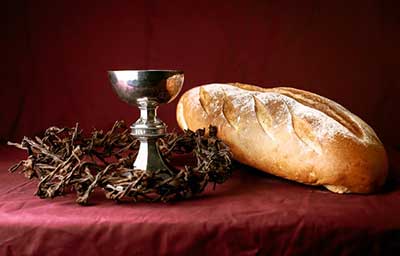This week marks the start of Lent, and this is the collect from the Book of Common Prayer that will be used in many churches this Ash Wednesday.
Observing Lent
Just when did Lent begin? It was first formally described at the Council of Trent in 325 AD, but evidence suggests that observing a Lenten season had been a practice from the earliest years of the church. It was focused on fasting, and to provide for new converts, especially, a period of reflection and repentance before being baptized at Eastertime. This practice echoes Jesus’s 40 days of fasting in the wilderness directly after his baptism by John the Baptist. The observance continues today in many forms, whether fasting from some type of food, social media, or some regular consumption.
“To Lengthen”
The word Lent is derived from an Anglo-Saxon word meaning “to lengthen,” suggesting both the lengthening of days in Spring and also the purpose of observing the season. Times of fasting, repentance and reflection serve to lengthen or stretch our spiritual muscles.
During King James’ time, Lent was observed by the Church of England; in fact, this collect was from its Book of Common Prayer (BCP) put together in 1549 by Thomas Cranmer and revised again by him in 1552. The biblical texts in these prayer books were based on the Great Bible, based on translation by Miles Coverdale combined with the text William Tyndale had completed before his martyrdom, but when the BCP was revised again in 1662, much of the Scripture was replaced with the King James Version text.
Lent and King James
At the time of King James, however, there were groups who would not celebrate Lent. The post-Reformation scene left wreckage of many Christian traditions and practices. While much of this reformation was for the good, many practices attached to the Roman church were thrown out simply because of association with the Catholic church and “popery.”. The fasting of Lent was seen by Puritans and Calvinists alike as “works righteousness.” Luther, on the other hand, found the practice of Lent an element of church life to be preserved.
The KJV sprang from a Christian culture that had differing opinions on the celebration of Lent- that divide continues to this day. Lent continues to be observed today by Roman Catholics and some Protestants, including Anglicans, Lutherans, Episcopalians, as well as some Methodists and Presbyterians.
Why Observe Lent?
Interestingly, many denominations that previously decried Lenten celebration, are recovering the church calendar, and with it, an attention to Lent. “Giving up” something is most often optional to avoid the same works righteousness their forefathers fled from, but a focused time spent on repentance and reflection is realized as good and profitable to the soul.
Indeed, a sobering of the spirit invites Christians to think about the depth of their sin and Christ’s sacrifice while looking forward to the celebration of redemption represented in our Easter feast. Fasting can make the anticipation of celebration sweeter, and isn’t Easter the best celebration for the Christian church?
The Lenten Fast is Heart Work
We see the biblical basis for fasting, both spiritual and physical, as Jesus himself did it for 40 days in the wilderness. How often, as well, do we see him drawing himself apart for prayer and communion with his Father. Fasting is mentioned as a spiritual discipline countless times in both the Old and New Testament.
What Does the Bible Say About Fasting?
Yet fasting was never to be a manifestation of “works righteousness.” Jesus teaches against this practice in his famous Sermon on the Mount. This text also provides the Gospel reading for the Ash Wednesday service.
“ Moreover when ye fast, be not, as the hypocrites, of a sad countenance: for they disfigure their faces, that they may appear unto men to fast. Verily I say unto you, They have their reward. But thou, when thou fastest, anoint thine head, and wash thy face; That thou appear not unto men to fast, but unto thy Father which is in secret: and thy Father, which seeth in secret, shall reward thee openly. Lay not up for yourselves treasures upon earth, where moth and rust doth corrupt, and where thieves break through and steal: But lay up for yourselves treasures in heaven, where neither moth nor rust doth corrupt, and where thieves do not break through nor steal: For where your treasure is, there will your heart be also. Matthew 6:16-21
What Does Jesus Say?
Clearly, Jesus is arguing against fasting as a work to be observed by others and commended. Instead, it is a work done in the heart where only God sees. Verses 19-21 add on to that idea, suggesting that our treasure should not be in our outward “works” or successes, or wealth. Instead, we should seek and love the things of heaven. So fasting should be about laying our hearts before God and asking him to help us to reorder what we love, storing up our treasure with Him.
Perhaps this is a way all Christians should view Lent, as in its original meaning, to “lengthen,” to stretch our understanding both of the depth of our sin and the overwhelming forgiveness and love of our Father God, and our eternal life to come.
The KJV for Lent
Psalm 139:23,24
“Search me, O God, and know my heart: try me, and know my thoughts: And see if there be any wicked way in me, and lead me in the way everlasting.”
Genesis 3:19
“..for dust thou art, and unto dust shalt thou return.”
Joel 2:12-13
“ Therefore also now, saith the Lord, turn ye even to me with all your heart, and with fasting, and with weeping, and with mourning: And rend your heart, and not your garments, and turn unto the Lord your God: for he is gracious and merciful, slow to anger, and of great kindness, and repenteth him of the evil.”
Psalm 103:8-14
“The Lord is merciful and gracious, slow to anger, and plenteous in mercy. He will not always chide: neither will he keep his anger for ever. He hath not dealt with us after our sins; nor rewarded us according to our iniquities. For as the heaven is high above the earth, so great is his mercy toward them that fear him. As far as the east is from the west, so far hath he removed our transgressions from us. Like as a father pitieth his children, so the Lord pitieth them that fear him. For he knoweth our frame; he remembereth that we are dust. “
II Corinthians 5:21
“For he hath made him to be sin for us, who knew no sin; that we might be made the righteousness of God. “
Psalm 51:1-17
“Have mercy upon me, O God, according to thy lovingkindness: according unto the multitude of thy tender mercies blot out my transgressions. Wash me thoroughly from mine iniquity, and cleanse me from my sin. For I acknowledge my transgressions: and my sin is ever before me. Against thee, thee only, have I sinned, and done this evil in thy sight; that thou mightest be justified when thou speakest, and be clear when thou judgest. Behold, I was shapen in iniquity: and in sin did my mother conceive me. Behold thou desirest truth in the inward parts: and in the hidden part thou shalt make me to know wisdom. Purge me with hyssop, and I shall be clean: wash me and I shall be whiter than snow. Make me to hear joy and gladness; that the bones which thou hast broken may rejoice. Hide thy face from my sins, and blot out all mine iniquities. Create in me a clean heart, O God; and renew a right spirit within me. Cast me not away from thy presence; and take not thy holy spirit from me. Restore unto me the joy of thy salvation; and uphold me with thy free spirit. Then will I teach transgressors thy ways; and sinners shall be converted unto thee. Deliver me from blood guiltiness, O God, thou God of my salvation; and my tongue shall sing aloud of thy righteousness. O Lord, open thou my lips; and my mouth shall shew forth thy praise. For thou desirest not sacrifice; else would I give it: thou delightest not in burnt offering. The sacrifices of God are a broken spirit: a broken and a contrite heart, O God, thou wilt not despise.”




